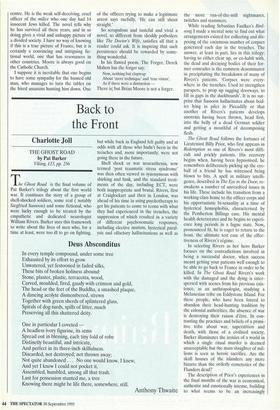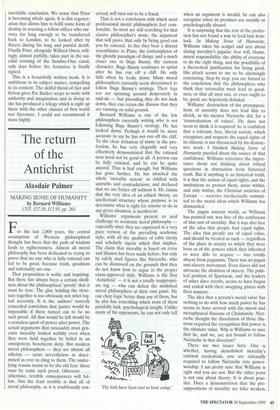Back to the Front
Charlotte Joll
THE GHOST ROAD by Pat Barker Viking, £15, pp. 256 The Ghost Road is the final volume of Pat Barker's trilogy about the first world war. It continues the story of a group of shell-shocked soldiers, some real ( notably Siegfried Sassoon) and some fictional, who were lucky enough to be treated by the empathetic and dedicated neurologist William Rivers. Barker uses this framework to write about the lives of men who, for a time at least, were too ill to go on fighting,
but while back in England felt guilty and at odds with all those who hadn't been in the trenches and, more importantly, were not going there in the future.
Shell shock or war neurasthenia, now termed 'post traumatic stress syndrome' was then often viewed as synonymous with shirking and funk, and the standard treat- ments of the day, including ECT, were both inappropriate and brutal. Rivers, first at Craiglockart and then in London, was ahead of his time in using psychotherapy to get his patients to come to terms with what they had experienced in the trenches, the suppression of which resulted in a variety of different psychosomatic responses, including elective mutism, hysterical paral- ysis and olfactory hallucinations as well as the more run-of-the-mill nightmares, twitches and stammers.
While reading Sebastian Faulkes's Bird- song I made a mental note to find out what arrangements existed for collecting and dis- posing of the enormous number of corpses generated each day in the trenches. The answer, at least in part, lies in this trilogy; having to either clear up, or co-habit with, the dead and decaying bodies of their for- mer comrades is the common denominator in precipitating the breakdown of many of Rivers's patients. 'Corpses were every- where in the trenches. Used to strengthen parapets, to prop up sagging doorways, to fill in gaps in the duckboards'. It is no sur- prise that Sassoon hallucinates about bod- ies lying in piles in Piccadilly or that another of Rivers's patients develops anorexia having been thrown, head first, into the belly of a dead German soldier and getting a mouthful of decomposing flesh.
The Ghost Road follows the fortunes of Lieutenant Billy Prior, who first appears in Redemption as one of Rivers's most diffi- cult and prickly patients. His recovery begins when, having been hypnotised, he remembers deliberately picking up the eye- ball of a friend he has witnessed being blown to bits. A spell in military intelli- gence, described in The Eye in the Door, re- awakens a number of unresolved issues in his life. These include his transition from a working-class home to the officer corps and his opportunistic bi-sexuality at a time of hysterical homophobia, characterised by the Pemberton Billings case. His mental health deteriorates and he begins to experi- ence long periods in a fugue state. Now, pronounced fit, he is eager to return to the front, the ultimate test case of the effec- tiveness of Rivers's regime.
In selecting Rivers as her hero Barker focuses on the contradictions involved in being a successful doctor, when success meant getting your patients well enough to be able to go back to France in order to be killed. In The Ghost Road Rivers's work with the damaged and the dying is inter- spersed with scenes from his previous exis- tence, as an anthropologist, studying a Melanesian tribe on Eddystone Island. For these people, who have been forced to abandon their head-hunting tradition by the colonial authorities, the absence of war is destroying their raison d'être. In con- trasting the practices and beliefs of a primi- tive tribe about war, superstition and death, with those of a civilised society, Barker illuminates the ironies of a world in which a single ritual murder is deemed unacceptable but the mass slaughter of mil- lions is seen as heroic sacrifice. Are the skull houses of the islanders any more bizarre than the orderly cemeteries of the Flanders dead?
The description of Prior's experiences in the final months of the war is economical, authentic and emotionally intense, building to what seems to be an increasingly inevitable conclusion. We sense that Prior is becoming whole again. It is this regener- ation that allows him to fulfil some form of destiny in rescuing a fellow officer who sur- vives for long enough to be transferred back to London, to be looked after by Rivers during his long and painful death. Finally Prior, alongside Wilfred Owen, will- ingly, almost joyfully, takes part in the sui- cidal crossing of the Sambre-Oise canal, only days before the Armistice is finally signed.
This is a beautifully written book. It is ambitious in its subject matter, compelling in its content. The skilful blend of fact and fiction gives Pat Barker scope to write with authority and imagination and in doing so she has produced a trilogy which is right up there with the other classics of first world war literature. I could not recommend it more highly.



































































 Previous page
Previous page